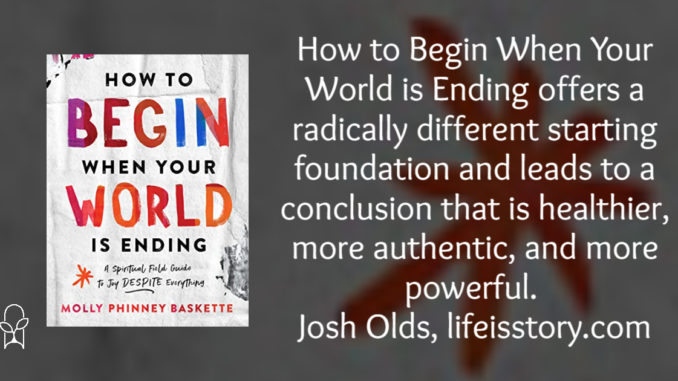
Published by Broadleaf Books on November 15, 2022
Genres: Non-Fiction, Christian Life
Buy on Amazon
Goodreads

Molly Baskette bears witness to the most vulnerable, aching, confusing, and frail moments in people's lives. She has served as a pastor to people convicted of heinous crimes, those living with treatment-resistant depression and PTSD, people suffering from unremitting eating disorders, domestic and sexual abuse survivors, those experiencing pregnancy loss or divorce, people fleeing violence in another country, and those coming out as queer to fundamentalist parents or discerning their true gender. But when she was diagnosed with an aggressive cancer at age thirty-nine, Baskette's understanding of God changed.
The truth is that not one of us will make it through this life unscathed. Suffering will come. Our resiliency in life comes not just from suffering, but from how we find meaning in it all. Many of us see belief in God and religion, generally, as about arranging the religious truths we know into a cohesive system, a blueprint, for understanding faith and meeting real-world challenges. In her witty and thoughtful way, Baskette tosses aside that blueprint and pointedly asks us to explore our assumptions about our faith, our life, and our purpose. Spoiler alert: she beat the cancer. But that didn't stop life from happening--there was still hardship and a church fire and suffering. And there was still God, helping Baskette make meaning of it all. Weaving together her cancer experience and the stories of those she has encountered in her life of faith, Baskette helps us press a thumb against the bruise of the reality that this sweet, hard, wonderful gig of being human will someday come to an end and perhaps sooner than we expect. In doing so, she finds hope, banishes fear, and helps us--and herself--find our way back from despair.
In the acknowledgements at the end of this book, Molly Phinney Baskette writes that working title of this book was God is Not an Asshole. I really wish they had kept that title. Don’t get me wrong, How to Begin When Your World is Ending: A Spiritual Field Guide to Joy Despite Everything is a fine title—if a bit wordy. The difference I see is that the final title projects more anthropology. It’s more human-centered. God is Not an Asshole is more theological. It’s an apologetic that is focused on how we can find joy amid suffering—and that is by understanding God’s role in our suffering.
Baskette weaves a theology of God redeeming suffering and trauma amid her own personal stories of loss. Most dominantly, Baskette writes of her cancer diagnosis. She’s raw, intense, and vulnerable. And through that you see how God works to make beauty from ashes. Baskette also dives into her pastoral history. In the preface, she says that this is “a book about the Someones I have pastored through some of the hardest things life can throw our way.” As such, the book isn’t just a field guide on how to begin when your world is ending, but models how to guide others through trauma and crisis.
I also appreciate that How to Begin When Your World is Ending doesn’t take the stance that God is a divine puppet master, ordaining every action and causing every movement. We are not God’s chess pieces. There is a strain of theology that teaches that any suffering we have is God-ordained and caused for our sanctification. Thus, there can be no space for lament because everything is God-caused and God-purposed and, since God don’t make no mistakes, this too is the will of God.
Right in the title of Chapter 1, Baskette declares quite boldly “God Didn’t Send the Disaster (But She Will Use It). Reading this made me reflect on a child loss in my family. It was a loss through a disrupted adoption and extremely destabilizing for my family. Suddenly a child we thought would be part of our family wasn’t—and had in fact been placed in a much more precarious situation. When I had to announce that to my church as their pastor, I was devastated. With great intentions, various church members ascribed it to God’s will and others to Satan’s doing. I couldn’t appreciate the irony at the time. It was that loss that made me really reflect on that aspect of my theology. What did I conclude? Exactly what Baskette concludes: God doesn’t send evil—but they will use it for their glory.
How to Begin When Your World is Ending is a call out of safe theology and into the vulnerability of unknowing. It’s a call to truly feel one’s emotions, to acknowledge the depth of sorrow and pain, and to find solace in God and God’s people. Baskette is clear that this isn’t easy. It’s holy work that doesn’t always feel holy and like Habakkuk you’ll find yourself shouting at God in anger.
As a pastor, I read this book pastorally and it strengthened my ideas and resolve around pastoral care. It encouraged me to lead with authenticity and vulnerability and to willingly enter into those vulnerable places with others to just sit with them and be God’s presence among them. As someone who has experienced trauma (and who hasn’t), How to Begin When Your World is Ending was a breath of fresh air that reminded me how to find redemption in the small things and see God’s presence amid the pain. There have been a lot of books written to Christians about finding joy amid suffering. This is like none of them. How to Begin When Your World is Ending offers a radically different starting foundation and leads to a conclusion that is healthier, more authentic, and more powerful.
